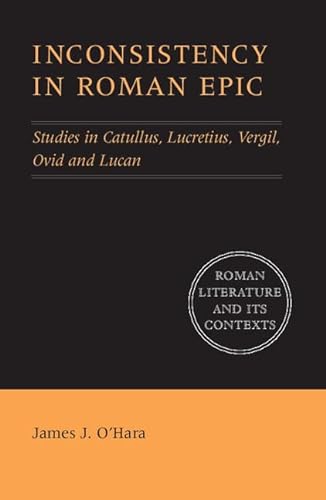Verwandte Artikel zu Inconsistency in Roman Epic Hardback: Studies in Catullus,...
Inconsistency in Roman Epic Hardback: Studies in Catullus, Lucretius, Vergil, Ovid and Lucan (Roman Literature and its Contexts) - Hardcover

Inhaltsangabe
Explores the possibility of providing literary interpretations of inconsistencies in five Roman epics.
Die Inhaltsangabe kann sich auf eine andere Ausgabe dieses Titels beziehen.
Über die Autorin bzw. den Autor
James J. O'Hara is George L. Paddison Professor of Latin at the University of North Carolina, Chapel Hill. He is the author of Death and the Optimistic Prophecy in Vergil's Aeneid (1990) and True Names: Vergil and the Alexandrian Tradition of Etymological Wordplay (1996), as well as numerous articles and reviews on Latin literature.
„Über diesen Titel“ kann sich auf eine andere Ausgabe dieses Titels beziehen.
Neu kaufen
Diesen Artikel anzeigenGratis für den Versand innerhalb von/der USA
Versandziele, Kosten & DauerSuchergebnisse für Inconsistency in Roman Epic Hardback: Studies in Catullus,...
Inconsistency in Roman Epic
Anbieter: PBShop.store US, Wood Dale, IL, USA
HRD. Zustand: New. New Book. Shipped from UK. Established seller since 2000. Artikel-Nr. FM-9780521641395
Anzahl: 4 verfügbar
Inconsistency in Roman Epic
Anbieter: PBShop.store UK, Fairford, GLOS, Vereinigtes Königreich
HRD. Zustand: New. New Book. Shipped from UK. Established seller since 2000. Artikel-Nr. FM-9780521641395
Anzahl: 4 verfügbar
Inconsistency in Roman Epic: Studies in Catullus, Lucretius, Vergil, Ovid and Lucan
Anbieter: Revaluation Books, Exeter, Vereinigtes Königreich
Hardcover. Zustand: Brand New. 165 pages. 8.00x5.25x0.75 inches. In Stock. Artikel-Nr. __052164139X
Anzahl: 1 verfügbar
Inconsistency in Roman Epic: Studies in Catullus, Lucretius, Vergil, Ovid and Lucan
Anbieter: Revaluation Books, Exeter, Vereinigtes Königreich
Hardcover. Zustand: Brand New. 165 pages. 8.00x5.25x0.75 inches. In Stock. Artikel-Nr. x-052164139X
Anzahl: 1 verfügbar
Inconsistency in Roman Epic: Studies in Catullus, Lucretius, Vergil, Ovid and Lucan
Anbieter: moluna, Greven, Deutschland
Gebunden. Zustand: New. How should we react as readers and as critics when two passages in a literary work contradict one another? Classicists once assumed that all inconsistencies in ancient texts needed to be amended, explained away, or lamented. This book explores the possibili. Artikel-Nr. 594754626
Anzahl: 1 verfügbar
Inconsistency in Roman Epic : Studies in Catullus, Lucretius, Vergil, Ovid and Lucan
Anbieter: AHA-BUCH GmbH, Einbeck, Deutschland
Buch. Zustand: Neu. Neuware - How should we react as readers and as critics when two passages in a literary work contradict one another Classicists once assumed that all inconsistencies in ancient texts needed to be amended, explained away, or lamented. Building on recent work on both Greek and Roman authors, this book explores the possibility of interpreting inconsistencies in Roman epic. After a chapter surveying Greek background material including Homer, tragedy, Plato and the Alexandrians, five chapters argue that comparative study of the literary use of inconsistencies can shed light on major problems in Catullus' Peleus and Thetis, Lucretius' De Rerum Natura, Vergil's Aeneid, Ovid's Metamorphoses, and Lucan's Bellum Civile. Not all inconsistencies can or should be interpreted thematically, but numerous details in these poems, and some ancient and modern theorists, suggest that we can be better readers if we consider how inconsistencies may be functioning in Greek and Roman texts. Artikel-Nr. 9780521641395
Anzahl: 1 verfügbar

